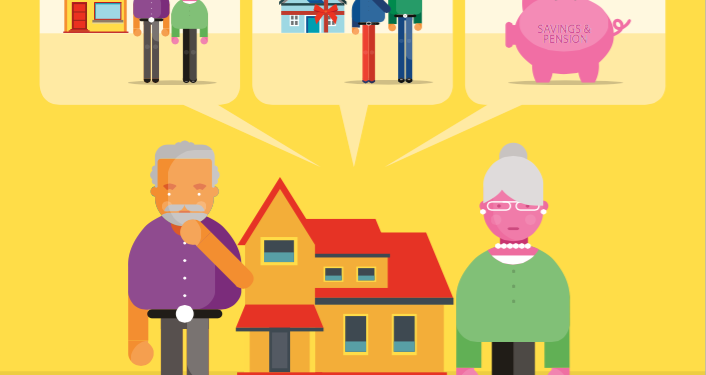Homeowners aged 45 to 54 years are almost as likely to see their home as part of their retirement income planning as their inheritance planning, according to a report from Aviva.
Long term growth in UK house prices and homeowners’ lasting attachment to their homes has led 58 per cent of 45 to 54-year-olds to see the wealth built up in their property as a key part of their retirement income plans. A generational shift in attitudes means this group are almost as likely to see property wealth as part of their retirement income plans as their inheritance plans, with 60 per cent seeing their home as something they will pass on to their children.
Across all over-45s, 46 per cent – equivalent to 6.08million UK households – see their home as part of their retirement planning.
The research, in Aviva’s latest Real Retirement Report, finds 69 per cent of over-45 homeowners say that their home is worth more than their pensions, savings and investments combined. With an average house price of £264,402 – 27 per cent more than the UK average across all ages of £209,000 – even those over-45s who still have mortgage debt are likely to have significant equity built up in their property.
The average over-45 homeowner has owned just three properties in their home-owning ‘life and has lived in their current home for 21 years.
Asked about their plans for retirement, 80 per cent want to remain living in their home for as long as they are physically able to. Just 26 per cent have either downsized already or plan to do so in the future.
Asked whey they want to stay put 31 per cent said ‘because they are happy or content’, 26 per cent said they valued their independence and 12 per cent said they live in a convenient and safe neighbourhood. The most common motive for downsizing is to find a home that is easier to maintain, an issue for 41 per cent, rather than financial reasons.
The research found 31 per cent of over-45 homeowners have already or plan to give money to help a child buy their own home, and those who have made an average contribution of £25,090. Most of those who provide financial support use their savings and investment income to do so, with 71 per cent to pay for a deposit and 10 per cent buying a property outright.
But 37 per cent said they would like to help a family member get on the ladder but can’t afford to and 52 per cent do not feel comfortable giving this help without knowing how much money they need themselves to live on in later life. Aviva says this finding reflects its own data that shows making their money last long enough is people’s biggest concern in retirement.
Aviva Equity Release managing director Roger Marsden says: “When discussing using property to support an income in retirement, downsizing is one option for discussion, particularly as many people might not need family homes as they enter retirement.
“However, the reality of downsizing can be harder – it potentially means letting go of friends nearby, moving away from transport links and communities that people know and use, plus the additional stress of going through the house selling and buying process. It’s understandable that the majority of people say they want to stay in their homes if they can.”





